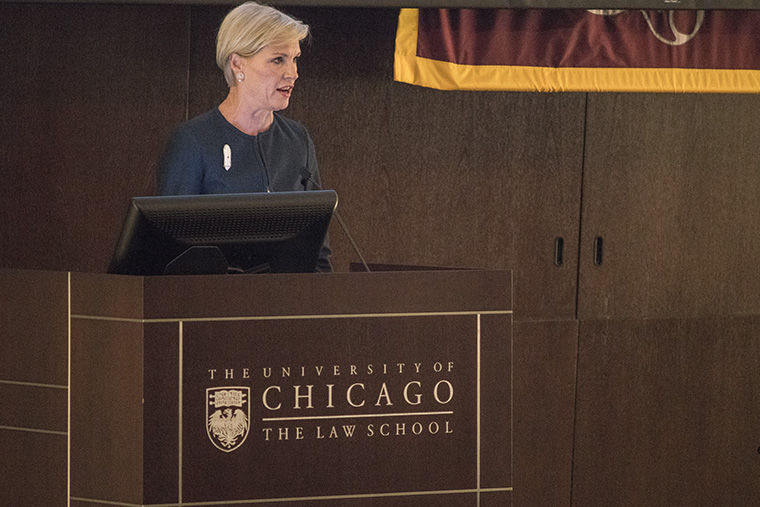Planned Parenthood president talks women’s healthcare, ‘fragile’ reproductive rights under Trump
University of Chicago Law welcomed Planned Parenthood President Cecile Richards on Nov. 29 to talk about how women’s healthcare will change with Donald Trump as president-elect.
December 5, 2016
As President-elect Donald Trump prepares to take office in January, Cecile Richard President of Planned Parenthood explained that the future of reproductive rights are more fragile than ever before.
“When it feels like the rug has somewhat been pulled from underneath us and when the future of reproductive rights in America is frankly as fragile and more uncertain than any time in my lifetime, there are some signs of hope,” Richards said in the beginning of the lecture.
Women’s healthcare and birth control were major topics Richards discussed during the annual Ulysses and Marguerite Schwartz Memorial Lecture Nov. 29 at the University of Chicago Law School, 1111 E. 60th St.
Students, teachers, professionals and Chicago residents gathered to hear Richard’s lecture during which she went through the history of reproductive rights and birth control for the future of women. She also explained the importance of the appointment of the next U.S. Supreme Court justice because of the potential reversal of Roe v. Wade.
Richards had been invited to address the future of reproductive rights after Trump’s election, since he campaigned for the reversal of Roe v. Wade, and his running mate Mike Pence is opposed to abortion and federal funding of Planned Parenthood.
She said although the political climate has changed, there are ways to move forward.
Since the election, Richards stated that 260,000 people have made donations of $5 and $10 and noted that appointments for IUDs have gone up 900 percent.
“There are some advances in the world that even politics can’t reverse,” she said. “And on that front, one of my favorites is technology. It gives us an opportunity to reach more people in new ways than never before.”
Richards said technology could help women in undeserved areas via telemedicine, which connects patients and doctors hundreds of miles away via video conference, allowing MDs to diagnose conditions and prescribe drugs and devices that can be delivered by airlift.
Richards also explained that teenagers have greater access to birth control, and studies show that teens are more likely to delay sexual intercourse because they are more aware of the consequences.
Gina Olson, associate director of the Center for Study of Gender and Sexuality at U of C, said the lecture, which took a year to plan, was part of a project that questioned whether Americans, mostly women, are able to exercise their full citizenship if they do not have full rights to reproductive health services.
“Pregnancy alone should not determine your future,” she said. “We need to protect birth control, access to abortion and all these healthcare points.”
Olson added that Richards, as president of Planned Parenthood and a world leader, is in a unique position to provide an overview of the future of reproductive health.
Outside, pro-life supporters surrounded the building, protesting against Richards advocacy for reproductive choice.
Protesters from the Pro-Life Action League Organization—a grassroots direct action group involved in public protests, public prayer and organizing nationwide rallies and events—held up signs with pictures of a deceased male fetus that read, “Cecile Richards: What about his future?”
Eric Scheidler, executive director of the Pro-life Action League Organization, who expressed the importance of keeping Trump accountable for pro-life stances he discussed during his campaign against pro-choice advocate Hillary Clinton, explained that the group reaches out to women considering abortion, offers help and also protests abortion by periodically engaging in political discussions.
“Planned Parenthood works very hard to minimize the awareness in the role they play in abortion,” Scheidler said.
During the lecture, Richards said nearly 650 Planned Parenthood health centers across the country are continuing to provide healthcare and education.
“It’s never been more important to stand up and fight for reproductive rights,” Richards said. “And fight for the future of our country and that’s what we are about doing.”








